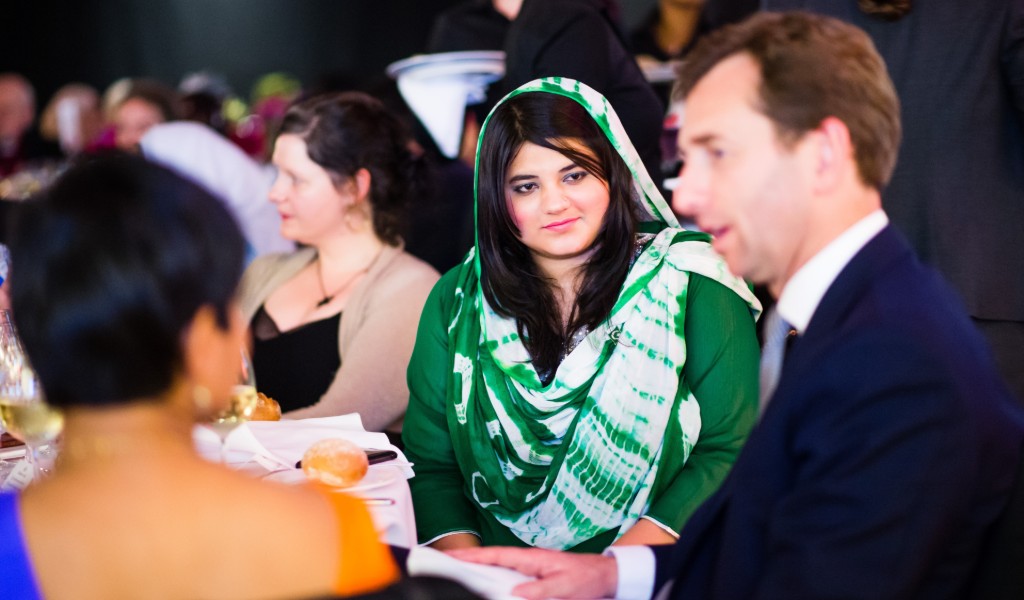Interview with Zainab Bibi on International Day of Women and Girls in Science
Published on 02/11/2016

Today is the very first International Day of Women and Girls in Science. The day, which has been declared by the United Nations, aims to promote gender equality and the empowerment of women and girls.
In recognition of the event, we talked to Zainab Bibi, one of our Queen’s Young Leaders from Pakistan, about her work. As well as establishing the Pakistan Society for Green Energy, Zainab has developed a bio-fuel from waste tissue paper which could help to provide cleaner energy. She also introduced into Pakistan, from the USA, a plant species that produces bioethanol (biodiesel). ‘Camelina sativa’ has a short growth cycle and a greater resistance to drought, which means that it can be grown in desert areas in Pakistan.
Here she answers some questions about her work:
How did you first become interested in the environment?
In 2010, I was selected as General Secretary of the Lahore Environment Awareness Forum and there I was exposed to many environment and energy challenges faced by Pakistan. It strengthened my belief in renewable energy and I decided to learn and contribute in this domain.
Tell us a little about the work of the Pakistan Society for Green Energy?
In February 2013 I established the Pakistan Society for Green Energy (PSGE) to facilitate and promote research on green energy and create awareness about environment related issues. The organisation helps young environmentalists in their research projects by providing necessary facilities, arranging equipment, linking them up with mentors and connecting them with some of the best laboratories in Pakistan. Besides that, we also create awareness about environmental issues through events such as Earth Day, Water Day, our Dengue Awareness programme and a Hazard and Disaster Management workshop.
How did you come up with the idea of developing a bio ethanol from waste tissue paper?
I am a passionate environmentalist, who believes that cleaner energy is an ultimate source for a sustainable world. In this regard, my first successful research project is a small step towards sustainable development, as I introduced an alternative method of ethanol (biofuel) production from waste tissue paper and paper waste. I was inspired to pursue this project because ethanol is a biofuel which has great economic importance, especially as an environment friendly fuel.
However, traditionally it was produced by fermentation of glucose, derived from agricultural feedstock and its production could intensify the world food crisis. Therefore, I decided to look for an alternative ethanol fuel resource and successfully used cellulosic substances from waste tissue paper and paper that can potentially minimise our dependence on petroleum reserves and reduce the disposal load on the landfills.
How could the ‘Camelina sativa’ change life for people in Pakistan?
Followed a month-long fellowship visit to the USA, I introduced a foreign plant species named Camelina sativa into Pakistan. Camelina sativa is a plant that has a very short growth cycle, a greater resistance to drought and low temperature and the capacity to grow in marginal soils.
I have successfully grown this plant in Pakistan and produced bio-diesel from it. Now, I am working to grow this in big desert areas of Pakistan that suffer from severe drought conditions. If successful, this will not only change the destiny of poor people living in these areas, but it could also be introduced in other such regions in the world.
Why is it important for women and girls to get involved in science?
Scientific research is not always planned; in fact all major inventions are impulsive. Therefore, if we limit the role of women in science then we will limit the field, because women bring new perspectives and context to research and this is very important to take it forward.
In addition, I believe women are the most affected stakeholder in the environmental crisis and are most likely to be affected by energy shortages or food crises. So we should be involved in researching solutions to these problems.
How do you think the Queen’s Young Leaders Award will help you in your work this year?
Since being announced as the first Pakistani woman to receive the Queen’s Young Leaders Award, it has raised awareness of my project. I have received a lot of support for my work.
I believe that people have great expectations of me now and, with the support of the Queen’s Young Leaders family, I hope to be able to fulfil them.
